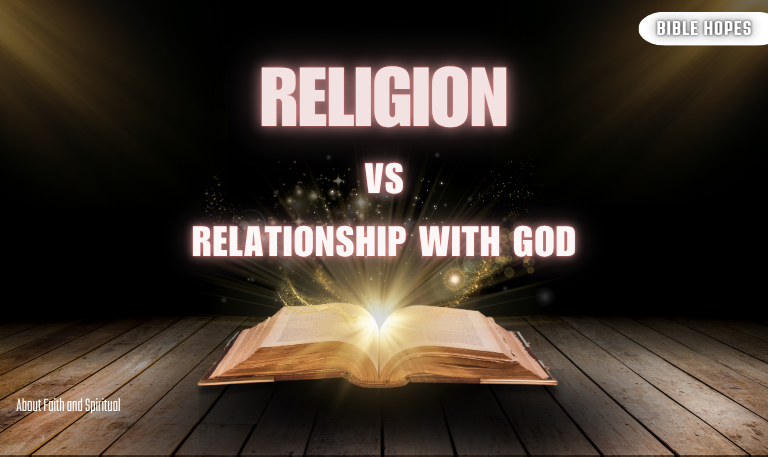In today’s spiritual landscape, the conversation around religion vs relationship with God has become increasingly relevant. Many people wrestle with the question: Is it enough to follow religion, or is cultivating a personal relationship with God the real essence of faith? This article dives deep into this topic, exploring biblical insights, theological distinctions, and practical guidance to help you discover a more intimate and meaningful spiritual life.
1. Why “Religion vs Relationship With God” Matters
The distinction between religion and a personal relationship with God is not just academic—it’s transformational. For many, religion is synonymous with spirituality, but others feel religion alone is insufficient for true connection with the divine. Understanding this difference helps people navigate their faith with clarity and find genuine peace and purpose.
2. What is Religion?
Religion is a system of beliefs, practices, rituals, and moral codes shared by a community. It often involves organized structures, clergy, sacred texts, and ceremonies designed to worship a higher power.
Core Elements of Religion
Rituals and ceremonies (e.g., prayer, sacraments)
Doctrinal teachings and creeds
Institutional organization (churches, mosques, temples)
Moral and ethical codes
Community and tradition
Religion can provide identity, structure, and collective worship but can sometimes emphasize external adherence over internal transformation.
Read Also: Psalms on Praise
3. Understanding Relationship With God
In contrast, a relationship with God is a personal, intimate connection that transcends rituals or institutions. It involves:
Daily communication (prayer, meditation)
Trust and faith in God’s character
Experiencing God’s presence and guidance
A heart-centered approach to spirituality
Transformation by love, grace, and forgiveness
This relationship is dynamic and grows over time, emphasizing closeness rather than obligation.
4. Key Differences: Religion and Relationship
| Aspect | Religion | Relationship With God |
|---|---|---|
| Focus | External rituals and rules | Internal connection and faith |
| Motivation | Obedience, tradition, community | Love, trust, intimacy |
| Expression | Formal ceremonies, sacraments | Personal prayer, listening, fellowship |
| Flexibility | Structured, often rigid | Fluid, evolving |
| Measure of Faith | Following prescribed rules | Heart transformation and faithfulness |
5. Biblical Insights on Religion and Relationship
The Bible offers rich perspectives on this distinction:
Jesus’ Critique of Religious Formalism
Jesus often confronted the Pharisees for their focus on outward rituals while neglecting inner righteousness (Matthew 23:27-28). He stressed that true worship comes from the heart (John 4:23-24).Faith Over Works
Paul the Apostle emphasized that salvation and relationship with God come by faith and grace, not by works of the law (Ephesians 2:8-9).Covenantal Relationship
Throughout the Old Testament, God sought a faithful covenantal relationship with His people, not just ritual compliance (Hosea 6:6).
6. How Religion Can Help Your Relationship With God
Religion is not inherently negative. It can provide:
Structure and Discipline: Rituals and traditions can cultivate spiritual habits.
Community Support: Belonging to a faith community fosters accountability and encouragement.
Sacred Texts and Teachings: They offer guidance and wisdom to deepen faith.
Access to Spiritual Resources: Clergy, counseling, and educational programs.
When religion serves as a foundation, it can lead believers toward a richer relationship with God.
7. Ways Religion Can Hinder Spiritual Intimacy
However, religion can sometimes become a barrier:
Legalism: Overemphasis on rules can lead to judgment and guilt.
Ritualism: Performing rituals without heartfelt faith can become hollow.
Spiritual Pride: Comparing oneself to others based on religious performance.
Fear and Condemnation: Religion can sometimes evoke fear rather than love.
Recognizing these pitfalls is key to moving from religion to relationship.
8. Developing a Genuine Relationship With God
Steps to Cultivate Intimacy
Prioritize Daily Prayer and Meditation
Build habits of honest communication with God.Study Scripture Reflectively
Seek to understand God’s heart and promises.Practice Forgiveness and Grace
Open your heart to God’s transformative love.Be Vulnerable and Authentic
Share your doubts, fears, and joys with God.Seek the Holy Spirit’s Guidance
Invite God’s presence to lead your spiritual growth.
9. The Role of Faith and Grace
Faith is the foundation of relationship with God — believing beyond what is seen.
Grace means receiving God’s love and forgiveness as a gift, not as something earned by religious works.
This contrasts with religion’s focus on performance, enabling freedom and transformation.
10. The Holy Spirit’s Role in Relationship vs Religion
The Holy Spirit is described as a helper, guide, and comforter (John 14:26), actively working within believers to:
Foster understanding and wisdom
Produce spiritual fruit (love, joy, peace)
Empower personal transformation
Spirit-led faith transcends mere ritual, emphasizing dynamic, personal communion with God.
11. Overcoming Common Challenges and Doubts
Guilt from Religious Shortcomings: Embrace God’s forgiveness.
Feeling Distant from God: Seek to listen more and control less.
Pressure from Religious Communities: Maintain respectful boundaries while following your spiritual path.
Doubt: Use questions as a gateway to deeper faith, not a barrier.
12. Balancing Religion and Relationship in Daily Life
Many believers find a healthy balance:
Participate in communal worship and sacraments.
Engage in personal devotional time.
View religious observances as tools, not ends.
Foster continuous growth in faith and love.
13. Religion vs Relationship Across Different Faith Traditions
While this article focuses primarily on Christianity, similar dynamics exist in other faiths:
Islam: Balance between following Sharia (law) and developing personal submission to Allah.
Judaism: Torah observance alongside a covenantal relationship with God.
Hinduism and Buddhism: Ritual practices vs personal enlightenment and devotion.
Read Also: What Does Submissive Mean In The Bible
14. Modern Spiritual Trends: From Religion to Relationship
There is a growing movement of people identifying as spiritual but not religious (SBNR), emphasizing:
Personal experience over institution.
Flexibility and inclusivity in belief.
Direct connection to the divine.
This shift reflects a desire for authenticity and intimacy over formality.
Religion Vs Relationship With God FAQs
Q: What is the main difference between religion and a relationship with God?
A: Religion focuses on organized practices and rituals, while a relationship with God emphasizes personal intimacy and faith.
Q: Can you be religious and still have a personal relationship with God?
A: Yes, religion can support and enrich a personal relationship if approached with sincerity and openness.
Q: How do I know if my faith is based on religion or relationship?
A: Reflect on whether your faith is driven by rules and fear or by love, trust, and ongoing communication with God.
Q: Is religion necessary to have a relationship with God?
A: Religion is not strictly necessary; many develop relationships with God independently, though religion can provide helpful guidance.
Q: How does Jesus define true worship?
A: Jesus taught that true worship is “in spirit and truth” (John 4:23-24), focusing on heartfelt devotion rather than external form.
Q: What role do rituals play in spirituality?
A: Rituals can help focus the mind and express faith, but they should not replace genuine relationship or heart transformation.
Q: Can religion lead someone away from God?
A: If religion becomes legalistic or hypocritical, it can hinder spiritual growth and intimacy with God.
Q: How can I deepen my relationship with God daily?
A: Engage in prayer, meditation, scripture reading, and listen for God’s guidance throughout your day.
Q: Are there biblical examples of people choosing relationship over religion?
A: Yes, Jesus commended the repentant sinner and criticized religious leaders for neglecting justice, mercy, and faithfulness.
Q: How do I handle family or community pressure about religion?
A: Maintain respect but follow your conscience and spiritual convictions with humility and love.
Conclusion
Religion provides community, structure, and tradition, but the heart of spirituality is a living, personal relationship with God. By moving beyond rituals to intimacy, believers discover freedom, joy, and profound transformation. The biblical message invites all to pursue God with their whole heart.



![15 Pink Bible Verses | Discover Meaning, Love [2025 Guide] 5 15-Pink-Bible-Verses-Discover-Meaning,-Love-[2025-Guide]](https://biblehopes.com/wp-content/uploads/2025/05/15-Pink-Bible-Verses-Discover-Meaning-Love-2025-Guide.png)